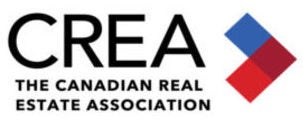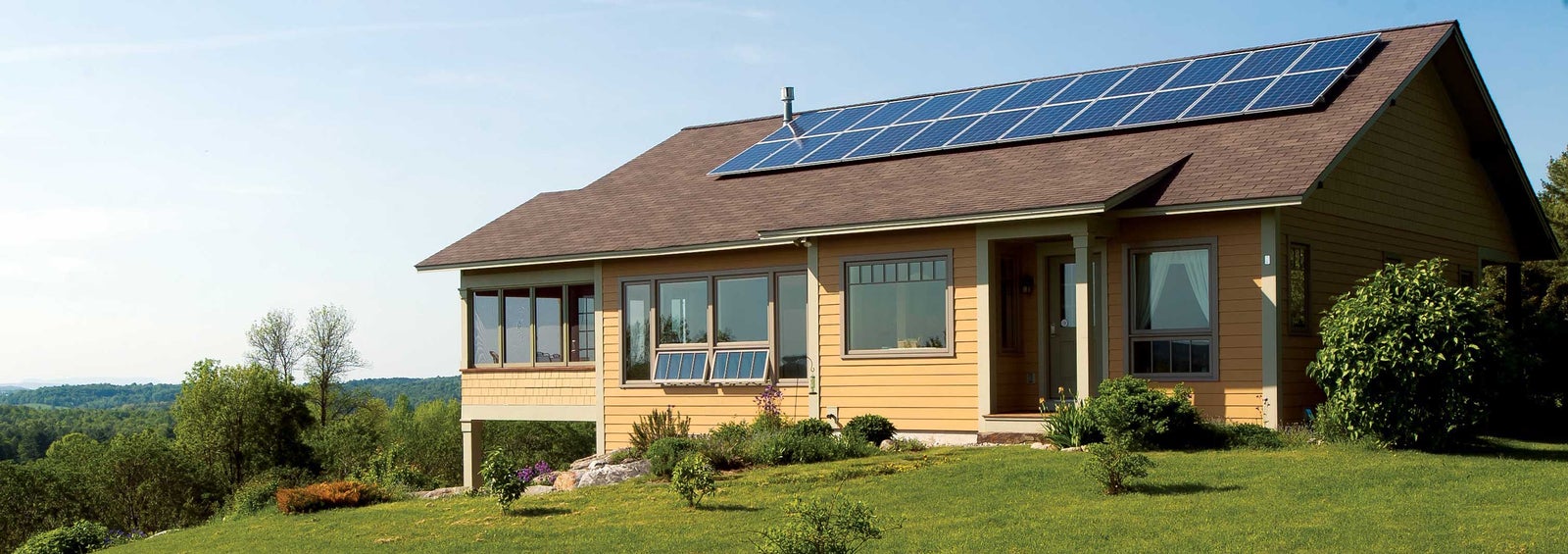Introduction
Energy efficiency involves using less energy and using energy responsibly. It can impact every aspect of our lives, including what we buy and where we live. When it comes to homes, it is important to know how your home operates and uses energy, while becoming more mindful of energy sources.
Choosing to buy a new energy- efficient home or making energy efficiency upgrades to your home is a great start to living more comfortably and saving on energy bills. By making energy efficiency choices, you’re also helping to protect our environment.
Facts about our homes
- There are 14.5 million homes across Canada
- They make up 17% of Canada’s energy use
- They produce 14% of Canada’s greenhouse gas emissions (GHG)
- 83% of energy used in homes is for space and water heating
How do our homes impact the environment?
The accumulation of greenhouse gas (GHG) emissions in the atmosphere is causing a “greenhouse effect” on the earth’s climate. This is evident in increasing average air and ocean temperatures, widespread melting of snow and ice, and rising average sea levels. What many of us don’t realize is that our homes are a contributor to GHG emissions. The housing sector in Canada provides significant potential for the reduction of the country’s ecological footprint.Today, 17 per cent of all energy used in Canada goes towards running our homes, generating 14 per cent of the country’s GHG emissions. This makes your home a great place to start reducing your energy footprint. Since most of the energy we consume comes from fossil fuels, the energy we can save heating and cooling our homes will help decrease our impact on the environment.
What makes a home energy-efficient?
We all need a shelter. We need to heat our homes in the winter, cool our homes in the summer, turn on the lights, and use our appliances. This all comes at a cost to you, the homeowner, both financially and comfort-wise. Living in an energy-efficient home may help you alleviate these costs by reducing the amount of energy required to operate your home, while also benefiting from features that help improve your comfort. Considering how much of our time we spend indoors, it’s good to know that an energy-efficient home is more comfortable to live in. When you’re ready to sell, having an energy-efficient home also means comfort and savings for future owners, which may give you that extra edge on the market. If you’re planning to buy a home, it can also come in handy to know what energy efficiency features to look for.What are the benefits of an energy-efficient home?
The benefits of an energy-efficient home can often seem invisible. However, you may recognize energy efficiency features and feel it all around you in other ways. For example, when you don’t feel drafts around your windows, or when all your rooms have even temperatures – that’s energy efficiency. An energy efficiency upgrade such as higher levels of insulation in your basement, roof and exterior walls means that you will use less heating and cooling energy to achieve and maintain a comfortable temperature. An energy-efficient home is a more comfortable home that can save you money on utility bills while helping to reduce emissions.- More Comfort: an energy-efficient home stays warmer in the winter, cooler in the summer and is comfortable to live in all year round.
- Lower Energy Bills: smarter energy usage reduces unnecessary operating costs for your home.
- Increased Value: proven energy efficiency upgrades, such as improvements to your furnace or windows, may add value to your home.
- Reduced Environmental Impact: using less energy means less GHGs, which helps reduce negative impacts on the environment and climate change.
What to know if you’re a seller
- Energy efficiency is an important selling feature. In a recent homebuyers’ study, three out of the top ten ‘must have’ home features were related to energy efficiency.1
- An energy-efficient home has many benefits. It is less expensive to heat and cool, more comfortable to live in, has improved indoor air and is environmentally friendly. If you’re completing renovations before you sell, think about incorporating energy efficiency features.
- Let prospective buyers know if your home has an energy efficiency home label. Labels such as EnerGuide, ENERGY STAR® or R-2000 identify if a home is energy-efficient – an appealing selling feature for prospective buyers. You may also ask your REALTOR® to highlight this in the listing information to allow energy- conscious buyers to see that your home is already energy- efficient. Whether it is a home, furnace, or window label, you may wish to consider featuring these brands in your listing and advertising the related benefits (e.g. increased insulation, balanced temperatures, fewer drafts, reduced energy bills and more efficient windows).
- Brands can make a difference. Notably, 83% of Canadians recognize the ENERGY STAR® symbol.2
- An EnerGuide energy evaluation provides an easy- to-understand guide that will recommend improvements to your home.
- Many regional programs offer money to improve your home’s energy efficiency.
2 NRCan ENERGY STAR® and EnerGuide Labelling Awareness Survey, 2016.
What to look for if you’re a buyer
- Look for an energy efficiency home label – this can mean savings on utility bills and increased comfort.
- If a home has an EnerGuide label, that means an EnerGuide home evaluation was completed. Ask your REALTOR® if the owner has provided a copy of the EnerGuide homeowner report. This can provide you with an overview of the energy performance of the home and possible energy efficiency upgrades. If the home had an improved rating due to those upgrades, consider the benefits when purchasing that home compared to others.
- Look for the ENERGY STAR® home label. These homes are on average 20% more energy- efficient than typical new homes, which will save you money on utility bills, improve your comfort, and help the environment.
- Look for a highly efficient ENERGY STAR® certified furnace, A/C or appliances, which will save you money on energy bills in the years to come.
- Ask your REALTOR® if energy ratings are displayed in the listing information, so you can compare with other homes on the market.
EnerGuide, ENERGY STAR and R-2000 labels help Canadians make informed decisions when it comes to choosing energy-efficient homes and products. More information on these initiatives can be found in the sections that follow.
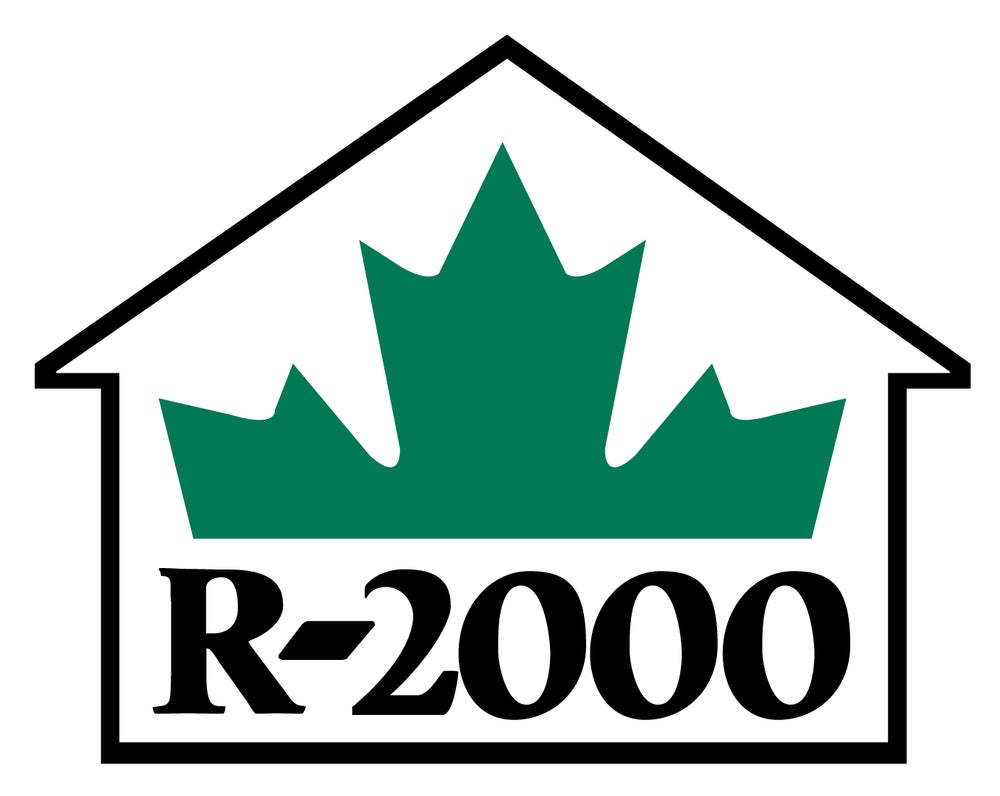

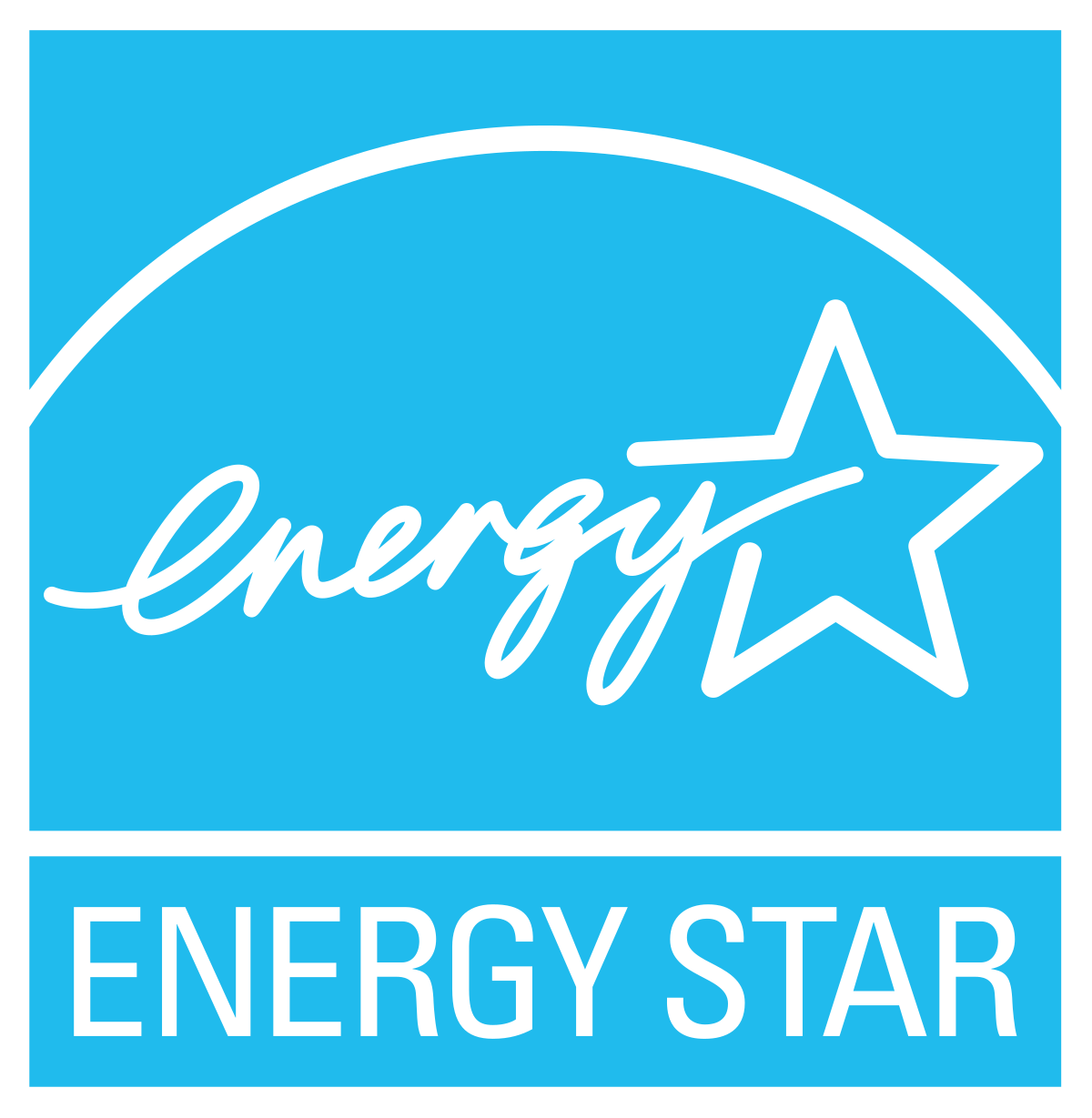
Guide to energy efficiency home labels
EnerGuide home label – evaluating your home to increase savings and comfort
An EnerGuide home evaluation is a service that provides useful information that can come in handy for both sellers and buyers. An EnerGuide home evaluation provides you with a comprehensive service that includes:• A visit by a third-party Energy Advisor
An energy advisor working with a third-party service organization will come to your home to evaluate your home’s energy performance from the basement to the attic. These energy experts bring industry expertise right to your door.Please note that while energy advisors and service organizations use Natural Resources Canada’s (NRCan) official marks, trademarks, and software under a licencing agreement, they operate as independent businesses, and are not agents, partners, or employees of NRCan.
• Home energy use information
An EnerGuide home evaluation gives you detailed information about your home’s energy performance and which house components are the best retrofit options for reducing energy consumption.• An EnerGuide rating and home label
An EnerGuide rating demonstrates the energy performance of a home and the label is proof of that energy rating. After the evaluation is performed for your home, the label will be affixed to your electrical panel. A second label with an improved rating is provided if the homeowner conducts energy efficiency upgrades based on the energy advisor’s recommendations. If you’ve purchased a brand new home, you may also have an EnerGuide label – that means that the builder worked with an energy advisor to incorporate energy efficiency features in the construction phase.• Recommendations
Personalized recommendations may be provided through an evaluation report. These recommendations can help you make decisions about which upgrades or renovations would save the most energy and money while also improving the overall comfort in your home.Contact a service organization in your area to arrange for an EnerGuide home evaluation at:
http://oee.nrcan.gc.ca/residential/personal/home-improvement/service/contact-advisors.cfm
Provinces are now switching from the previous 0-100 rating label to the new gigajoules label. Depending on where you live, your home may have one of these two labels:
EnerGuide Rating: 0-100 scale
The EnerGuide rating is a snapshot of the home’s energy performance at the time of the evaluation. It is the energy efficiency score of your home and it ranges between 0 and 100. The more efficient a house, the higher the rating number:0 represents a house with major air leakage, no insulation and high fuel consumption. In other words, a house with poor energy efficiency and high utility costs.
100 represents an airtight and well-insulated house where energy purchased and energy generated, through renewable sources, is equal. This is also called a ‘net-zero’ home.
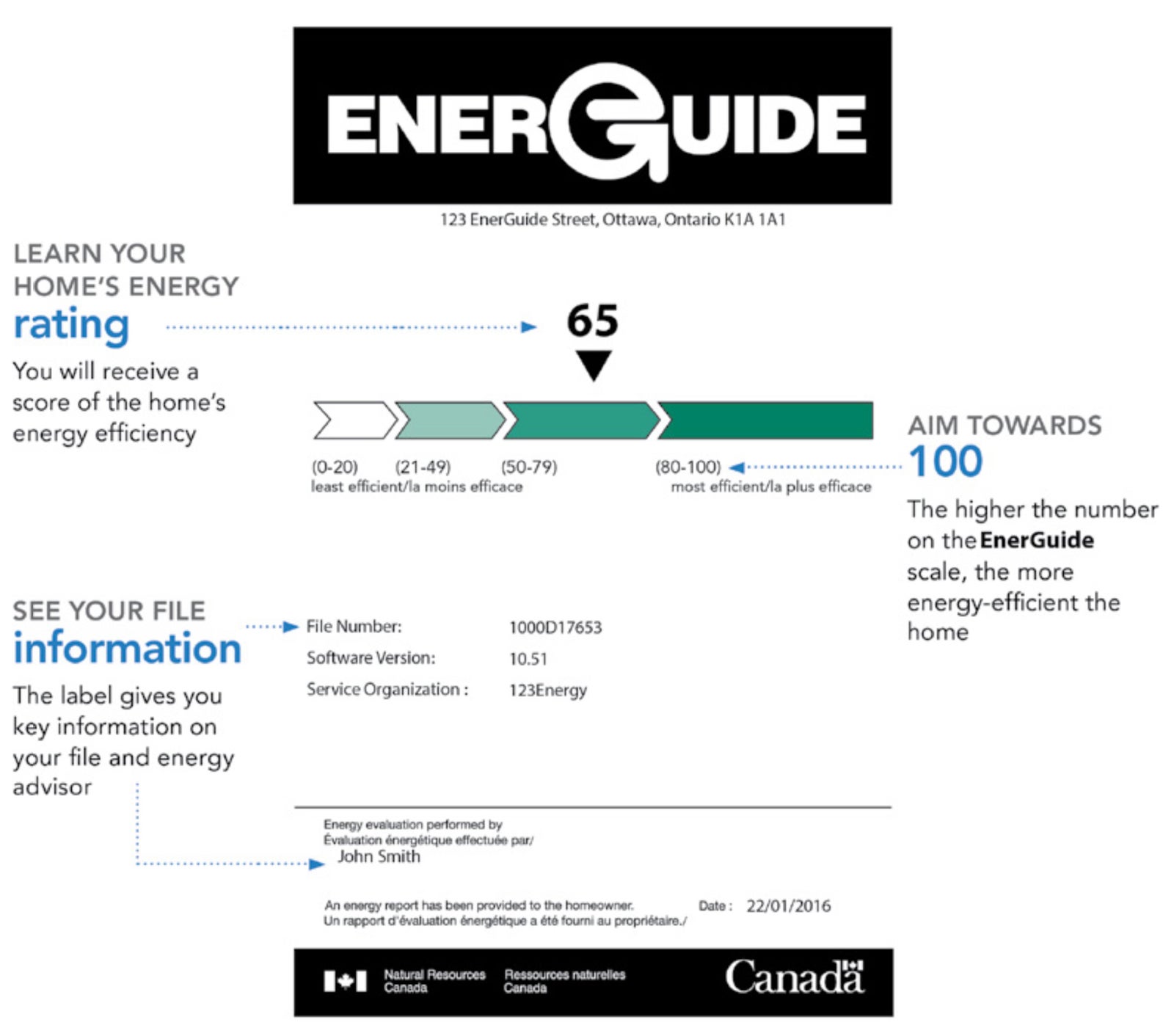
EnerGuide Rating: Gigajoules per year scale
The EnerGuide rating demonstrates the energy performance of a home. Aim towards zero on the rating scale. The lower the number, the better energy performance of the home.Best energy performance indicates high performing homes with a rating of zero gigajoules per year, meaning they produce as much energy as they consume. Generally, these homes would be highly energy-efficient.
An annual gigajoule rating (GJ/year) allows you to see your score as a unit of energy consumption, similar to how you would see a consumption rating of kilowatts per hour for appliances, litres per 100 kilometres for vehicles, or calories for food.
An annual gigajoule rating (GJ/year) allows you to see your score as a unit of energy consumption, similar to how you would see a consumption rating of kilowatts per hour for appliances, litres per 100 kilometres for vehicles, or calories for food.
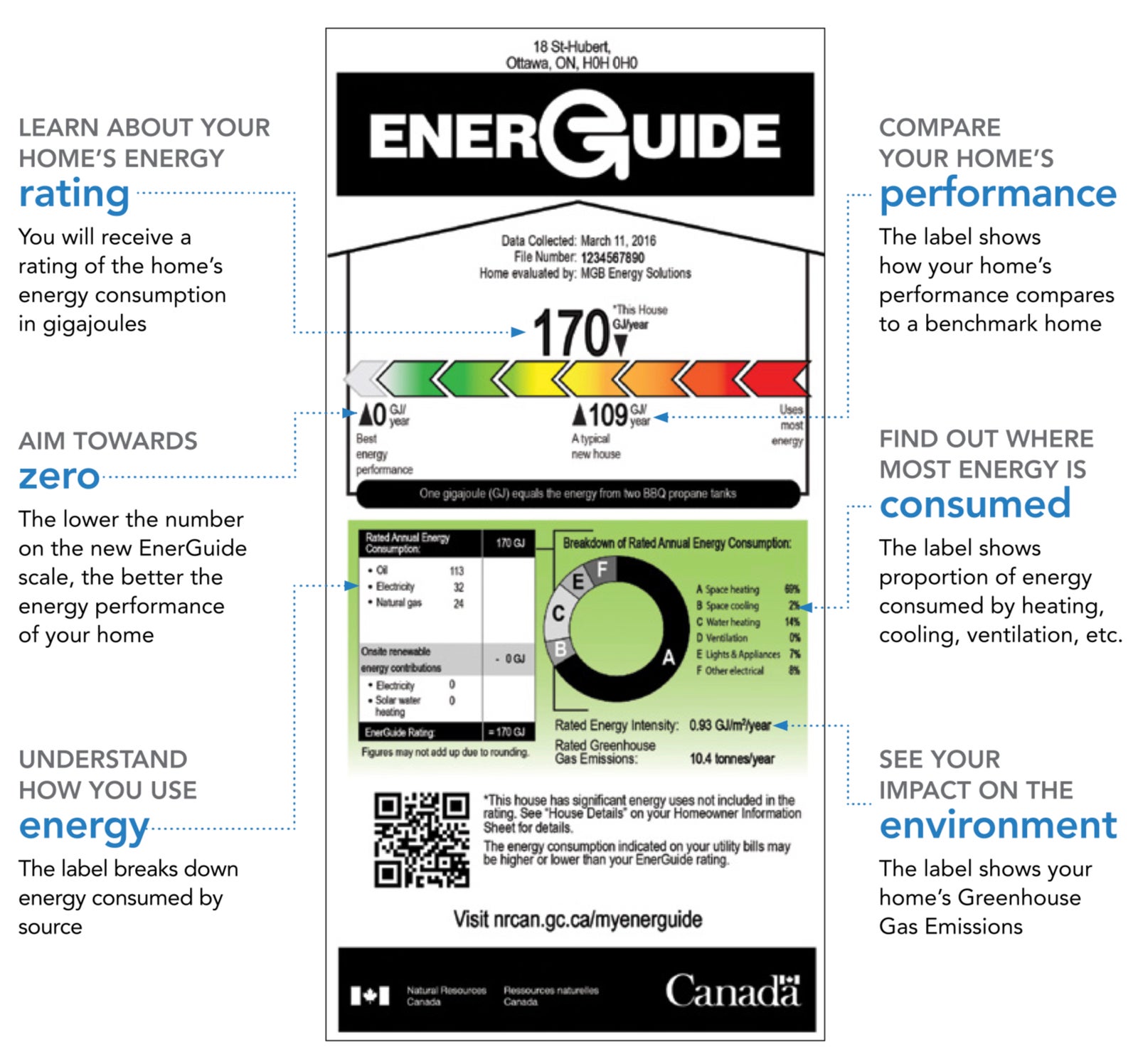
How much is 1 gigajoule of energy?
The average Canadian household uses 100 gigajoules of energy per year. A single gigajoule (GJ) of energy is equal to the energy consumed to do the following activities around your home:
- Vacuum your house for 230 hours
- Surf the web for 5,500 hours
- Watch all 1,230 NHL hockey games in an entire season
- Run a typical refrigerator for 30 weeks
- Wash over 100 loads of laundry
EnerGuide is the official mark of the Government of Canada for its energy performance rating and labeling program for key consumer items – houses, light-duty vehicles and certain energy-using products. The information provided by EnerGuide allows you to compare different models with confidence – it may be a rating number based on a standard measure, or a verified average of energy consumption.
ENERGY STAR label
ENERGY STAR certified home
The ENERGY STAR® symbol indicates that a product meets or exceeds high efficiency standards. ENERGY STAR homes are on average 20% more energy-efficient than typical new homes built to code. These homes are built to the ENERGY STAR for New Homes Standard by certified ENERGY STAR builders. Typical features of these homes include high levels of insulation, whole-house mechanical ventilation systems and highly energy- efficient windows. These features translate to savings on energy bills and increased comfort.ENERGY STAR certified products
Currently, more than 70 product categories can qualify for the symbol and typically a certified model is in the top 15 to 30 per cent of its class for energy performance.You can review the complete list of ENERGY STAR® certified products for your home on NRCan’s website:
http://www.nrcan.gc.ca/energy/products/energystar/why-buy/13631
http://www.nrcan.gc.ca/energy/products/energystar/why-buy/13631
R-2000 label
R-2000-certified new homes are best- in-class energy-efficient homes that include high levels of insulation, clean air features and measures to help protect the environment. Every R-2000 home is built to the stringent R-2000 standard developed by NRCan in coordination with key industry stakeholders. In addition, each home is:- Constructed by trained builders
- Evaluated, inspected and tested by an independent third-party inspector
- Certified: every R-2000 homeowner will receive an R-2000 certificate and label which can be placed on the electrical panel
http://www2.nrcan.gc.ca/oee/nh-mn/f-t/index.cfm?fuseaction=s.ssf&language=eng
Consumer caution: Natural Resources Canada never performs or authorizes others to perform unsolicited inspections of homes or home equipment with respect to the ENERGY STAR or EnerGuide initiatives. Home energy evaluations using the EnerGuide label are performed by third- party service organizations only at the request of homeowners.
Tips on making your home more energy-efficient
- Install a programmable thermostat: lower your home temperature at night and whenever you’re away for several hours. You can save up to two per cent on your heating bill for every degree you roll back the temperature.
- Seal air leaks around your front door, windows, and electrical outlets through measures such as weather- stripping and caulking.
- Change your bulbs: buy long-lasting ENERGY STAR®-certified light emitting diodes (LEDs).
- Insulate your pipes: cover the first two metres of hot and cold water pipes with foam sleeves or insulating wrap to save on water heating costs and lower water usage (leave a 15 cm (6-inch) clearance between insulation and vent pipes on fuel-fired water heaters).
- Improve insulation levels in your home walls, roof, attic, and basement.
- Get a timer for your block heater: set it to turn on just an hour or two before you need to start your vehicle.
- Upgrade your exhaust fans – choose ENERGY STAR®-certified models for your bathroom and kitchen and vent them outdoors. You can also add timers to reduce power consumption.
- Go low-flow: install water-saving toilets, faucet aerators and shower heads (rated at less than 7.6 litres per minute). You can also check and repair leaky faucets and outside hose bibs.
- Plug into power bars: choose models with timers or master plugs that can power-down devices when they are not in use so they don’t consume standby power.
- When buying new appliances and HVAC equipment, purchase those with the ENERGY STAR label or higher energy efficiency models.
- If you’re shopping for new lighting fixtures, buy ones that have earned the ENERGY STAR label.
- Replace older windows with energy-saving ones such as those certified as ENERGY STAR.
- Arrange for an EnerGuide home evaluation.
- Check with your REALTOR® to see if there are other modest ways to make your home more energy-efficient.
Checklist for identifying energy-efficient features and benefits
- ENERGY STAR® windows and doors: Better comfort, less noise coming from the outside and less condensation
- ENERGY STAR® certified appliances: Lower utility bills
- Whole-house mechanical ventilation systems: Filtered outdoor air for healthy living and fewer indoor air pollutants
- Higher levels of insulation in the basement, roof and exterior walls: Even temperatures and less noise coming in from outdoors
- ENERGY STAR® certified lighting: Lower utility bills as they use only one third or less of the energy as regular incandescent products
- An air barrier (similar to a continuous sealed envelope, mostly found in R-2000 homes) : Warm air is kept inside, drafts are reduced and moist air is prevented from entering walls
- EnerGuide home label: The home had an energy evaluation and may have had work done, such as improved insulation, upgraded windows or a new energy-efficient furnace or A/C
- ENERGY STAR® home label: On average, 20% more efficient than a typical new home when built to the latest Standard. Benefits include comfort, balanced temperature, and energy-efficient windows, lighting and appliances
- R-2000 home label: On average, 50% more efficient than a typical home. Benefits include comfort, indoor air quality and other environmental features
Resources and Government Programs
For more information on energy-efficient homes and if you’re interested in buying a new energy-efficient home, visit www.nrcan.gc.ca/homes or call 1-800 O-Canada or TTY: 1-800-926-9105 (teletype for the hearing-impaired).
Regional grants and financial incentives related to energy efficiency exist across Canada. Consult Natural Resources Canada’s website for some useful information on incentives specific to your region: http://www.nrcan.gc.ca/energy/funding/ efficiency/4947. Note, this is not an exhaustive list and is updated only as information is provided by organizations across Canada; therefore, please consult provincial or territorial, utility, or municipal websites for additional information.
Find Natural Resources Canada’s Keeping the Heat In guide online to learn about the basic principles of building science and find guidance on retrofit projects, such as insulation and air sealing improvements.
Credits
This publication is produced in collaboration with Natural Resources Canada.
*R-2000 and EnerGuide are official marks of Natural Resources Canada. The ENERGY STAR® mark is administered and promoted in Canada by Natural Resources Canada and used with permission.
The trademarks REALTOR®, REALTORS®, and the REALTOR® logo are controlled by The Canadian Real Estate Association (CREA) and identify real estate professionals who are members of CREA.
The terms REALTOR® and REALTORS® are trademarks owned by The Canadian Real Estate Association used to identify licensed real estate practitioners who are members of CREA. For members of CREA practicing in Quebec, please note that the term REALTOR® includes a broker who is a member of CREA (courtier immobilier membre de l’ACI).
*R-2000 and EnerGuide are official marks of Natural Resources Canada. The ENERGY STAR® mark is administered and promoted in Canada by Natural Resources Canada and used with permission.
The trademarks REALTOR®, REALTORS®, and the REALTOR® logo are controlled by The Canadian Real Estate Association (CREA) and identify real estate professionals who are members of CREA.
The terms REALTOR® and REALTORS® are trademarks owned by The Canadian Real Estate Association used to identify licensed real estate practitioners who are members of CREA. For members of CREA practicing in Quebec, please note that the term REALTOR® includes a broker who is a member of CREA (courtier immobilier membre de l’ACI).
